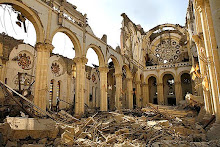 People love theater and love to be entertained. They also like to be surprised.
People love theater and love to be entertained. They also like to be surprised.One of the most popular shows on TV invites people from all walks of life to display their talent in front of three judges. If they prove to have a skill worthy of the stage they get an opportunity to advance in the competition for a chance at a career in show business. One appeal of the show seems to be the element of suspense as the audience experiences a role in the discovery of a new and exciting talent for singing, dancing or other means of entertainment. The show also affirms the nearly limitless ingenuity and resourcefulness of the human person, created by God with great dignity and potential.
The best and most captivating entrance is a humble one followed by the revelation of awe-inspiring greatness. Recently an unassuming young man on the show about which I have been speaking wowed the audience and had them on their feet cheering with his tremendous dancing after a very simple and self-effacing introduction. His talent far outweighed his sense of self-importance and endeared him all the more to the audience.
No one can outdo God. And when it comes to God's presence in our lives, no one is greater. In the gift of Himself in every Mass, truly present as He is in the Eucharist, no one outdoes God in humility for in this way the greatest becomes so small so as to be the least among us, inviting us to receive Him without fear.
God becomes most small, the least, in the death of Christ upon the Cross, whereby He made Himself the suffering Servant for the redemption all of humanity. His humility as Savior is also made present for us again each time we celebrate, worship and receive Him in His Eucharist.
"St. Augustine admirably summed up this doctrine that moves us to an ever more complete participation in our Redeemer's sacrifice which we celebrate in the Eucharist:
"The first announcement of the Eucharist divided the disciples, just as the announcement of the Passion scandalized them: "This is a hard saying; who can listen to it?" The Eucharist and the Cross are stumbling blocks. It is the same mystery and it never ceases to be an occasion of division. "Will you also go away?": the Lord's question echoes through the ages, as a loving invitation to discover that only he has "the words of eternal life" and that to receive in faith the gift of his Eucharist is to receive the Lord himself. (CCC 1336)
God's greatness in loving is evident in that He gives us what we most need in the Eucharist. We are sinners in need of redemption. With the exception of the case of mortal sin which must be forgiven sacramentally in confession to a priest, we should receive this Sacrament as often as possible for the forgiveness of our venial sins.
"Holy Communion separates us from sin. The body of Christ we receive in Holy Communion is 'given up for us,' and the blood we drink 'shed for the many for the forgiveness of sins.' For this reason the Eucharist cannot unite us to Christ without at the same time cleansing us from past sins and preserving us from future sins:
"In the liturgy of the Mass we express our faith in the real presence of Christ under the species of bread and wine by, among other ways, genuflecting or bowing deeply as a sign of adoration of the Lord. 'The Catholic Church has always offered and still offers to the sacrament of the Eucharist the cult of adoration, not only during Mass, but also outside of it, reserving the consecrated hosts with the utmost care, exposing them to the solemn veneration of the faithful, and carrying them in procession.' " (CCC 1378)
Love seeks union. God uses his infinite power in the Eucharist to make Himself one with us in the perfect union which satisfies the need of the one who loves to be one with the beloved.
"Holy Communion augments our union with Christ. The principal fruit of receiving the Eucharist in Holy Communion is an intimate union with Christ Jesus. Indeed, the Lord said: 'He who eats my flesh and drinks my blood abides in me, and I in him.' Life in Christ has its foundation in the Eucharistic banquet: 'As the living Father sent me, and I live because of the Father, so he who eats me will live because of me.'
This "greatest show on earth", the act of God who gives all His power to us who are powerless on our own in the battle against sin, is not done for applause. God's unforgettable performance on the altars of our churches everywhere is given because of Divine Love: God gives Himself under the signs of bread and wine to save us from our sins!
Praised be Jesus Christ, now and forever. Amen.
((((..))))







No comments:
Post a Comment